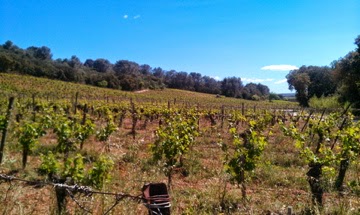Food and Farming Documentaries for You
Perhaps it has something to do with my being an avid eater,
writer of a food blog, and an educator. Whatever
the reason might be, I need to confess that I cannot seem to get enough of
food-oriented documentaries! Food, Inc., Forks over Knives, A Place at
the Table were just a few of the titles in this category that I have seen
recently. Now, my Amazon Instant Prime
“recommends” food documentary titles for me based on my previous viewing
history.
So it came to be that I spent three evenings this week
watching more food documentaries. Since
I’ve already spent that time, I thought that maybe I would offer brief reviews
in this space, so that others can choose which ones to watch. (Each heading title is a hyperlink, so you can be directed to the Amazon page that describes the movie.)
Sunday: Fresh
This might have been the best of the three I saw this
week. Though its 2009 production date
meant that the movie was quite a few years out of date, this documentary
delivered some searing images. (Beakless
and clawless chickens, the famous images of staggering cows suffering from mad
cow disease, etc.) Michael Pollan—whose Omnivore’s Dilemma seems to have lifted
him to such a level of fame that every food documentary wants him on camera—is
one of the experts in the movie, along with the likes of the
farmer-with-a-neat-vocabulary Joel Salatin who was featured in Omnivore’s Dilemma and who has since also
starred in American Meat (2013).
There’s a certain datedness in the visuals of the
documentary—a bit grey with some graininess—but the information it imparts
about the perils of mono-crops and increasingly sinister reach of near-monopoly
in big agri-business is worth viewing.
Monday: Ingredients
This 2011 movie is the slickest of the three I watched. It might have been the one that is most enjoyable to watch since, as it was
described by Amazon, it offered an uplifting narrative about the ways in which
French-inspired chefs like Alice Waters and the committed earnestness of small
organic farmers might actually be able to lift Americans out of the clutches of
obesity-producing and pesticide-ridden big agriculture.
In fact, the film had such great shots of bucolic multi-crop
countryside and mouthwatering produce-laden restaurant dishes that it could
qualify as farm-and-food porn. The Bebe
Neuwirth-narration actually was a bit jarring (since it was hard not to think
of Lilith), but this film might be the one I’ll watch with someone who actually
wants something feel-good.
Tuesday: Greenhorns
This 2013 entry felt more like an amateur production—well, because it
actually was, I think—and this would fill nicely the
Indie-documentary-about-small-farming niche (if one existed). The narrative voice here was also a bit
grating, not because of the famous intonations of the speaker but more so
because hers was clearly not a famous
or a well-trained voice. The earnestness
of the movie overall is winsome though.
Greenhorns
traversed the country interviewing 18, 19, and 20-something independent farmers
(sometimes doing as little as 2 acres of farming) about the trials and
tribulations of their chosen vocation.
These are clearly very committed young people, and you do root for them. You also get a sense though that they will be
able to lift themselves up and dust themselves off and be able to find jobs in
industrial design or pharmacological management should they fail at
farming. I’m not sure if that is a good
or a bad thing.
The Verdict
All in all, I’m glad to have seen all three movies. Fresh was informative and thoughtful; and Ingredients waxed poetically--and with beautiful images--about the virtues and benefits of farmer's markets and Community Supported Agriculture. (Photo above shows one of my weekly CSA bundles.) Greenhorns might not be for everyone, but I think Will and I need to take heed. After our trip to the south of France, Will
has visions of operating a 5-acre vineyard in Languedoc-Rousillon region
(like the photo at top of post). We need
to get our eyes opened quickly about the labor involved in what is sure to be a
lot of work.
In fact, all three movies conveyed quite clearly this common theme: farmers work really really hard, all the time.
In fact, all three movies conveyed quite clearly this common theme: farmers work really really hard, all the time.




Comments
Post a Comment